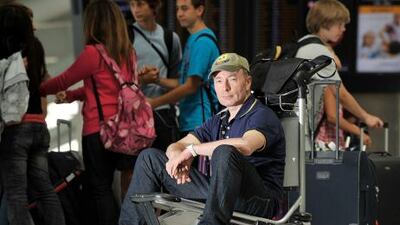Next time you feel someone paying a little too much attention to your comings and goings at an airport departure lounge, don't worry.
Books: The National Reads
Book reviews, festivals and all things literary
In fact, we suggest doing something ridiculously outlandish. Because, it seems, you could easily be the subject of a story by the airport's all-seeing writer-in-residence.
This month the best-selling "lad-lit" novelist Tony Parsons becomes the second author to take up the airport operator BAA's invitation to spend a week at Heathrow. In fact, he's there right now, observing stressed holidaymakers and bored business travellers, eagle-eyed security guards and overworked cleaners, as he works on a new book, Departures: Seven Stories From Heathrow. "I think airports are places of huge human drama," he said to the gathered press as he arrived on Wednesday. "I still feel a sense of wonder about flight."
Parsons' obvious enthusiasm may have had something to do with the flat fee he will receive from BAA - plus the commitment the airport operator has made not to meddle with the finished text. If he writes about shocking delays, apparently, that's fine. But Parsons is also likely to have been enticed by the sheer novelty of getting out of the house: writing is often a solitary pursuit undertaken in the quiet studies of suburban homes, not in the midst of a last call announcement for the 0930 flight to Abu Dhabi.
"As a writer, it's an absolute gift," said Parsons' predecessor, the philosopher-writer Alain de Botton, of his residency in 2009. And though De Botton took it rather more seriously than Parsons - actually setting up a desk in Terminal Five at which he switched on his laptop and wrote - there were drawbacks. "I do get asked where the toilets are," he told The Guardian newspaper in the UK at the time. The result, A Week At the Airport, wasn't De Botton's strongest work, but it did capture some of the pathos that we all experience at what he called "this strange non-place we are usually eager to leave".
So does tearing writers away from their bolt-holes help or hinder their work? For the enduring novelist Fay Weldon it did neither; her time as writer in residence at the Savoy hotel in London appeared to involve an expensive room, free breakfast, a literary dinner or two and a few articles written for the in-house magazine. Nice work if you can get it. When her three-month sojourn was announced in 2002, there was talk of the time spent in her luxury suite being used to finish off her new novel, but Mantrapped only saw the light of day two years later. Five years later, at the same hotel, Kathy Lette told The Telegraph that her most arduous job as writer-in-residence was "selecting a dish to be named after me on the Savoy's menu".
They were lucky. The usual lot of the less high-profile writer-in-residence is to be holed up in a prison somewhere, helping the inmates unlock their previously untapped creativity. In the UK, this is a job authors can actually apply for through the Writers In Prison Network. Many do. And the testimonies from the likes of the novelist Sophie King suggest that while this kind of experience might not have a direct impact on a specific book, it does naturally broaden an author's experience of life.
The author and poet Tobias Hill didn't get sent to prison in 2007 - he was instead named writer-in-residence at the English private school Eton (having previously completed a stint at London Zoo). But there was a curious symmetry. In his Eton Logbook, Hill tells of wanting to get some of the schoolboys out of the classroom to study strangers ("by which I mean, ordinary people", he writes), but finds that it's more difficult than he imagined. The boys are not, it transpires, allowed over the bridge into Windsor without special permission. The school, then, is a kind of open prison.
It's such revelations which make the work that arises from writers-in-residence programmes more akin to journalism than the source material for great works of fiction. Which is why it'll be so interesting to see how Parsons approaches Seven Stories From Heathrow.
Will the collection be thinly-veiled reportage, or something that mimics Parsons' inspiration for the project, Arthur Hailey's 1960s best-seller, Airport? If it does, the term "airport novel", that curious genre that has made millionaires of Jodi Picoult, Lee Child and John Grisham, will take on a whole new, more literal, meaning.

